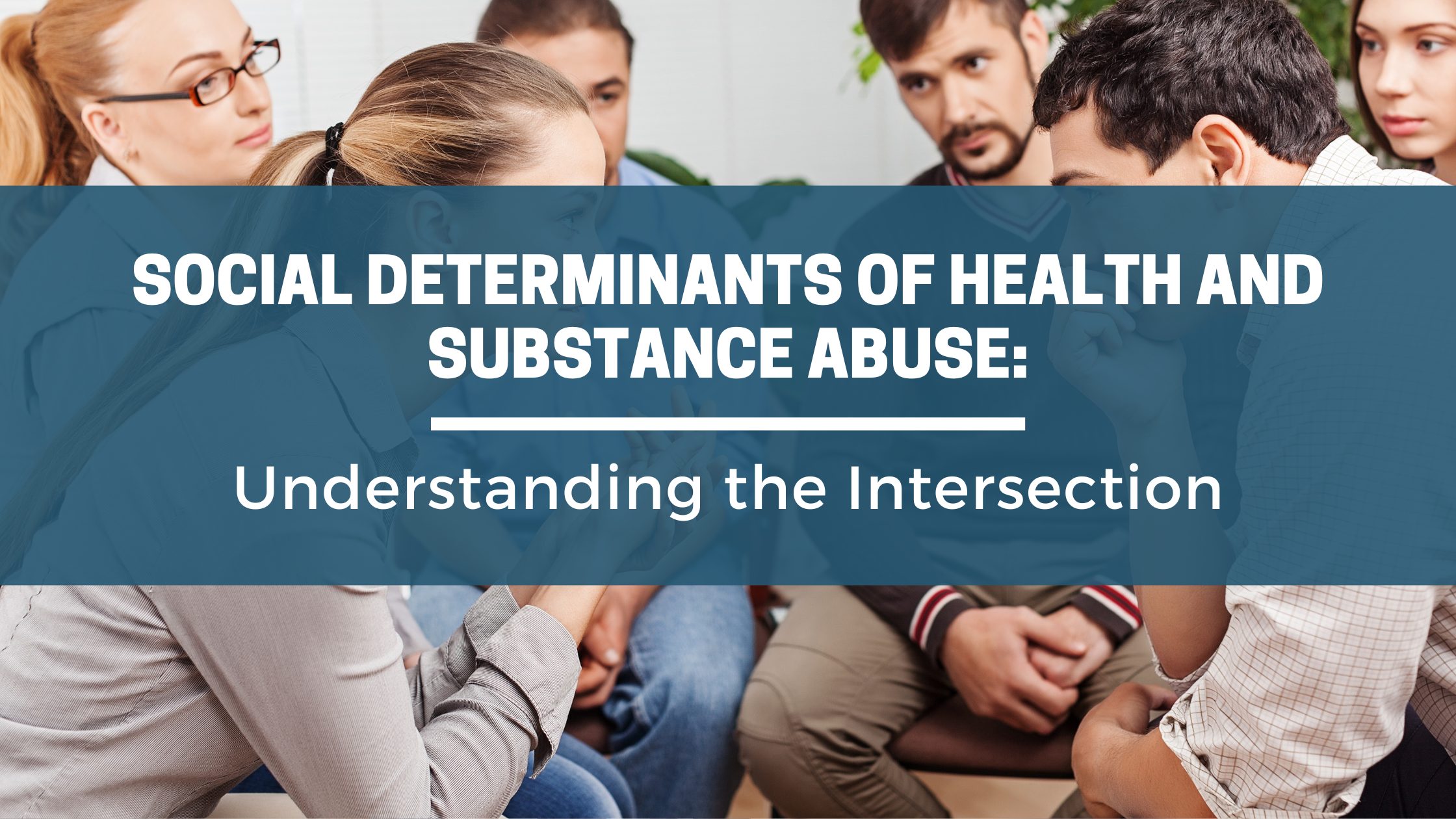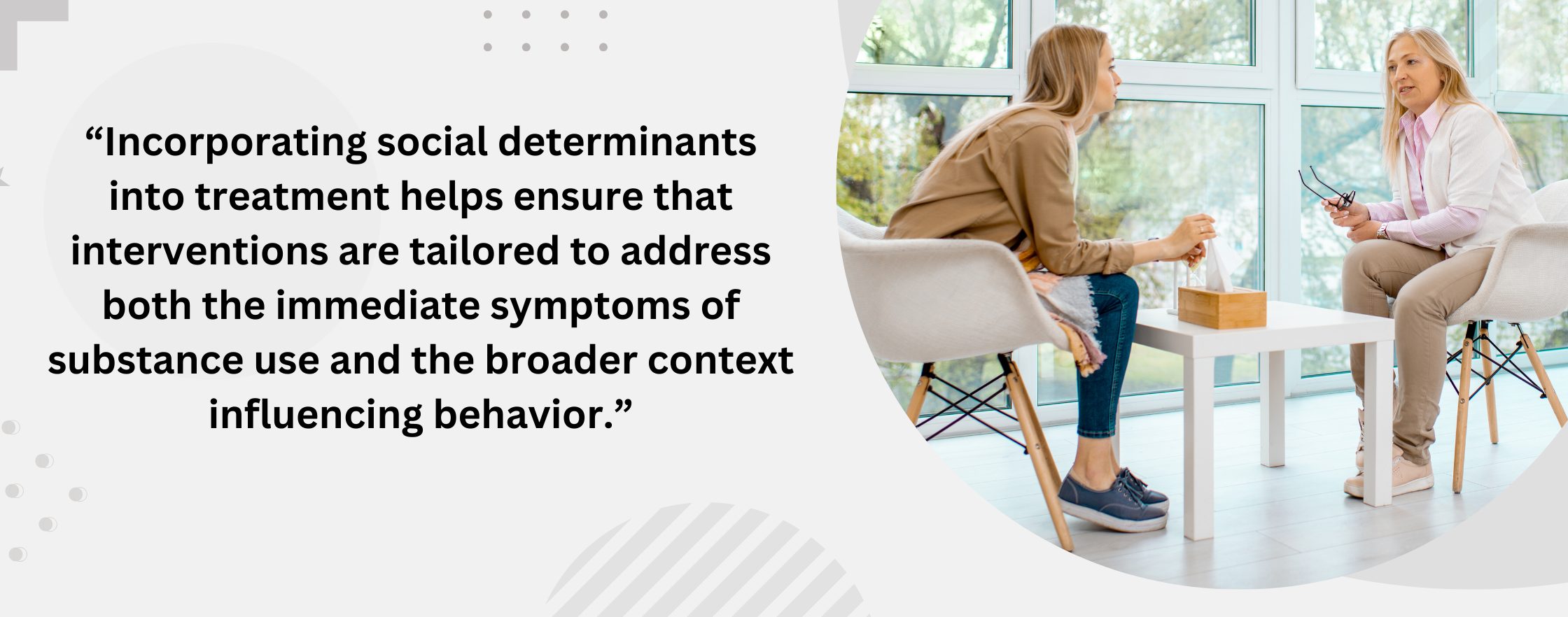
Social Determinants of Health and Substance Abuse: Understanding the Intersection
Social determinants of health (SDOH) significantly influence substance abuse patterns and outcomes. For behavioral health clinicians treating substance abuse, understanding these social determinants—factors like economic stability, education, social support, and access to healthcare—is essential for effective assessment and treatment. These factors shape a person’s susceptibility to addiction, recovery potential, and overall mental health outcomes, making substance abuse as much a social problem as an individual one.
Understanding the Intersection of Social Determinants of Health and Substance Use
For individuals struggling with substance use, social determinants of health (SDOH) play a critical role not only in the development of substance use disorders but also in their treatment and recovery. Addressing these factors is essential for creating long-lasting change. SDOH encompass a range of influences, from physical and mental health to access to food, perceptions of safety, past trauma, and social networks. By understanding and addressing these determinants, clinicians can more effectively support their clients through recovery, improving health outcomes and reducing the likelihood of relapse.
FREE DOWNLOAD:
As a mental health clinician, understanding the full scope of your client's challenges is essential to providing effective care. Our SDOH Risk Assessment is designed to help you quickly identify the social and environmental factors impacting your clients' well-being. Whether your client is facing financial instability, housing challenges, or lacks social support, this tool will allow you to assess their risk level and prioritize interventions. Download the assessment today to start uncovering the unseen influences that could be hindering your clients' mental health and well-being. Take a proactive step in delivering comprehensive care!

The Impact of SDOH on Substance Abuse
SDOH do not exist in isolation; they create complex conditions that can either promote well-being or contribute to harmful behaviors. Stress from economic instability, trauma, poor housing conditions, and lack of opportunities can increase the likelihood of substance use as a coping mechanism. A person facing chronic stress may turn to drugs or alcohol for relief, while someone living in an environment where substance use is normalized may have a harder time resisting.
By addressing the broader context of social determinants, clinicians can more effectively understand and treat substance use disorders. A clinician might find that a patient’s substance use is closely tied to economic insecurity or a history of untreated trauma. Only by incorporating these elements into treatment plans can clinicians offer a truly holistic approach.
Clinical Implications for Addressing Substance Abuse Risk Factors

Identifying and Understanding Social Determinants of Health
As a clinician, addressing social determinants of health means fully understanding the complex context in which substance abuse occurs. Social determinants of health include factors such as access to food, safety, past trauma, family history, and socioeconomic status, all of which shape a person's risk of substance use and their ability to recover. For instance, a patient living in an environment that normalizes substance use or is exposed to abuse may find it harder to achieve sobriety. Conversely, identifying and supporting healthy relationships and resources can improve outcomes for these individuals. Incorporating social determinants into treatment helps ensure that interventions are tailored to address both the immediate symptoms of substance use and the broader context influencing behavior.
Changing Social Determinants to Improve Outcomes
Effective substance use treatment cannot focus solely on the individual. Instead, it must consider their environment and support systems. Therapists can play a role in changing the social determinants affecting their clients, such as helping them connect to housing, employment, and educational resources. For clients living in unsafe environments, therapists can support them in identifying and exiting these situations. Addressing these changeable determinants creates conditions more conducive to sustained recovery.
SDOH Assessment and Screening
Integrating SDOH into clinical practice means using assessment tools that highlight social determinants, such as access to stable housing or employment. Clinicians should incorporate SDOH assessments as part of their intake procedures to better understand the context of a patient's substance abuse risk factors. This information allows the clinician to tailor interventions accordingly, creating a foundation for targeted and effective treatment. The ICANotes EHR software assists clinicians treating substance abuse by offering a comprehensive menu-driven biopsychosocial assessment that guides the process of collecting patient information specific to SDOH. It also includes more than 75 evidence-based assessment tools that can be completed electronically during the intake process.
Holistic Treatment Planning for Substance Abuse
An understanding of social determinants should directly inform treatment plans. Instead of focusing solely on symptoms or behaviors, holistic treatment planning recognizes the need to address underlying social challenges. Clinicians can connect clients with community resources such as housing programs, job training, and educational opportunities, which are crucial components of sustainable recovery. ICANotes’ fully-configured EHR software can support these approaches by helping clinicians to easily create multidisciplinary treatment plans that contain interventions specific to the patient’s underlying social challenges.
Addressing Addiction Stigma
Stigma around both substance use and the socioeconomic factors associated with it—such as poverty and homelessness—is another barrier to effective treatment. This stigma can prevent clients from seeking help or fully engaging in the treatment process. Clinicians can play a key role in combating stigma by fostering a nonjudgmental, supportive environment that encourages clients to open up about their struggles.
Addressing Specific Social Determinants of Health Factors

Identifying and Addressing Changeable and Unchangeable Factors
Effective treatment of substance use disorders requires addressing both the changeable and unchangeable social determinants of health. While some factors, such as housing and employment, can be improved through targeted interventions, others like trauma history and parental substance use are unchangeable but can be managed through acceptance and support strategies. Clinicians should work with clients to identify these determinants, support them in making changes where possible, and help them develop coping strategies for those factors that cannot be changed.
For example, connecting clients to community services that provide housing and food support can help mitigate the impact of economic instability. At the same time, supporting clients in processing their trauma or understanding the long-term effects of their family history can empower them to take meaningful steps toward recovery. By addressing both types of factors, clinicians can create a more balanced and realistic treatment plan.
Poverty and Economic Inequality
Economic instability is one of the most significant social determinants contributing to substance abuse. The stress of financial hardship can drive individuals to use substances as a coping mechanism. Clinicians can assist patients in navigating financial resources or connecting them with job training programs that might help alleviate some of their economic stressors.
Housing Insecurity
Housing insecurity significantly impacts an individual’s ability to recover from substance use disorders. Stable housing is a fundamental need that, when unmet, can derail progress made in therapy. Clinicians can advocate for housing stability by connecting patients with community resources or transitional housing options, ensuring they have the support they need for sustained recovery.
Healthcare Access
Access to healthcare is often a barrier for individuals with substance abuse issues. People with substance use disorders may face discrimination in medical settings or may not have the financial means to afford necessary care. Behavioral health clinicians can play an advocacy role, helping clients find affordable healthcare and coordinating care among providers to ensure continuity. ICANotes’ billing and coding capabilities can assist practices in securing higher reimbursement rates, which can support expanded access to services.
How Can Clinicians Focus on the Prevention of Substance Use?
Leaders in the field of addiction recovery are constantly hoping to reduce rates of substance use through prevention, but the prevailing notion is that prevention is too challenging. You’d have to accurately identify at-risk individuals, offer sound interventions, and track the outcomes, but simply providing the same strategies to all individuals would be a waste of resources.
Social determinants of health can be a wonderful tool when planning intervention focused on prevention. Rather than offering a blanket, one-size-fits-all approach to addiction prevention, clinicians can tailor offerings that target different groups of people based on their SDOH. Not all people will respond well to the same interventions, but this approach could add a level of efficiency to your service.
A therapist treating a teenager for anxiety or depression could take the opportunity to include information about substance use and the risks of using alcohol and other drugs as a way of self-medication. By providing this information, the therapist is working towards a model of prevention.
In another example, a clinician interested in prevention could solicit school and community leaders to provide substance use informational sessions to students and their parents. By forgoing a universal approach for one directly addressing that group's SDOH, the clinician could make a more impactful presentation.
Community-Based Interventions
Collaboration with Community Partners
Partnerships between healthcare providers and community organizations are essential for addressing SDOH. By collaborating with housing agencies, social services, and educational institutions, clinicians can provide more comprehensive care. ICANotes helps facilitate these efforts by providing a chart-centric workflow that captures each patient’s social context and supports coordinated interventions.
Harm Reduction Strategies
Harm reduction strategies, such as needle exchange programs and safe consumption sites, offer a pragmatic approach to reducing the adverse consequences of substance use. These strategies emphasize safety and health rather than immediate abstinence. By understanding and leveraging these community resources, clinicians can support patients at different stages of their recovery journey, whether they are ready to quit or not.
Policy Implications and Advocacy
Advocacy for Policy Change
Addressing substance abuse as a social problem means advocating for policy reforms that mitigate social determinants of health. Policies that support affordable housing, healthcare access, and education can create an environment where fewer individuals are driven to substance use as a means of coping. Behavioral health clinicians can play a role in these efforts by supporting policy initiatives that directly benefit their clients and reduce the risks associated with SDOH.

Final Thoughts: The Role of ICANotes in Supporting Clinicians
Social determinants of health have a massive impact on substance use, and addressing these factors is critical for successful treatment outcomes. Clinicians who integrate SDOH into their assessments and treatment plans can create more effective, personalized approaches that address both the symptoms of addiction and its root causes.
ICANotes is uniquely positioned to support behavioral health clinicians in this effort. Our EHR software is designed to be quick and intuitive, allowing clinicians to easily document social and clinical determinants without losing valuable time that could be spent on patient care. The billing module of ICANotes ensures that services are billed at the highest reimbursable levels, supporting practices financially while helping clinicians focus on what matters most—their patients.
If you are ready to take a more comprehensive approach to treating substance use disorders, consider using ICANotes for your practice. Our EHR not only helps in managing clinical documentation but also plays a role in improving client outcomes through effective coordination of care. Sign up today for a free trial or schedule a demo to see how ICANotes can transform your practice.
Start Free Trial (no credit card required)
About the Author

Eric Patterson, MSCP, NCC, LPC
Eric Patterson, MSCP, NCC, LPC, is a professional counselor who has been working for over a decade to help children, adolescents, and adults in western Pennsylvania reach their goals and improve their well-being.
Along the way, Eric worked as a collaborating investigator for the field trials of the DSM-5 and completed an agreement to provide mental health treatment to underserved communities with the National Health Service Corp.
Sources
Galea, S. and Vlahov, D. (2002). Social Determinants and the Health of Drug Users: Socioeconomic Status, Homelessness, and Incarceration.
Harvard Health. (2021). Poverty, Homelessness, and Social Stigma Make Addiction More Deadly.
Minnesota Department of Health. (2024). Social Determinants of Health: Substance Use.
National Institute on Drug Abuse. (2023). Social Determinants of Health Can’t Be Extricated from Addiction Science.









